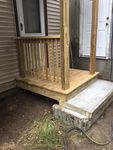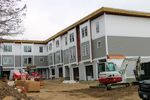COMMUNITY DEVELOPMENT WEEK - APRIL 5-9, 2021 - Fitchburg, MA
←
→
Page content transcription
If your browser does not render page correctly, please read the page content below
APRIL 5-9, 2021
COMMUNITY DEVELOPMENT WEEK
Updates from Fitchburg Community Development and Planning
YEAR 47 UPDATES
CDBG & HOME Overview Last month, the City
Council voted to approve
CDBG and HOME funding is a popular, bipartisan budget item that is
the Mayor's
administered to local governments nationwide through the
recommendations for
Department of Housing and Urban Development.
CDBG funding
In Year 46 (the current program year), the City was awarded A public hearing will be
$996,222 in CDBG funds and $510,558 in HOME funds. held on these projects on
April 28
In 2001, the City's CDBG award was $1,402,000, or $2,083,308 in The City will submit its
2021 dollars, and the HOME award was $635,000, or $943,581 in plan to HUD by May 14 in
2021 dollars. While this funding is incredibly valuable, and helps advance of the July 1
support needs across the City, staff and subrecipients are working to program year start
do more with less.
This year, with the help of Barrett Planning Group, staff started The Year 47 applications
preparing the next Five Year Consolidated Plan, which identifies brought both returning
priorities in the City and influences how funding is allocated in each applicants and new projects to
program year. The ConPlan will be released later this year. the table. In the upcoming
year, CDBG funds will be
The following pages highlight programs supported by CDBG and invested in youth programs,
HOME, as well as notes the leveraging impact of both these funds and small business supports,
Community Development staff, more generally. infrastructure improvements,
and more!Year 46 Program Highlights
Critical Home Repair - Habitat for Humanity
Before After
Habitat's program is a great complement to the City's Code Enforcement program. The organization
utilizes a combination of skilled and volunteer labor to make critical repairs to Fitchburg homes. Many of
Habitat's clients are elderly or disabled, and these repairs make the home livable for the resident.
Since becoming a subrecipient in Year 45, Habitat has completed projects in 9 homes, including 6 roof jobs.
These repairs would be otherwise prohibitively expensive for the homeowners, so in addition to livability,
these projects promote safety and preserve Fitchburg's housing stock
Spartacus - YMCA Downtown Coordinator
Fitchburg State University
The Downtown
Coordinator represents a
partnership between
Fitchburg State University
and the City of Fitchburg.
Hired shortly before the
COVID-19 shutdowns,
Marissa Monteiro has been working diligently
The YMCA Spartacus program serves at-risk with small business owners in the downtown
youth by providing homework help, leadership area to adapt to the unique challenges of this
training, and teambuilding. Each year, 50 past year. Her efforts include marketing
Fitchburg youth are enrolled in Spartacus. support, assistance with pandemic assistance
Program staff were quick to adapt to the COVID grants, and outreach to assess the needs of the
restrictions, providing online workshops and businesses.
check-ins while gathering in person was an
impossibility. This spring, Marissa hopes to partner with the
City to launch a series of safe, outdoor events
downtown.Program Highlights
Small Business Technical Assistance Police Department Drug
NewVue Communities Enforcement and Foot Patrols
NewVue Communities offers a variety of The Police Department works hard to protect the
resources for area residents and businesses. residents of Fitchburg, and that includes getting
Their Small Business Technical Assistance illicit substances off the streets. The Drug
program supports fledgling and established Enforcement and Foot Patrols program provides
businesses through the creation or updating of funding for police overtime to perform surveillance
business plans, finding financial resources to and controlled seizure of drugs, and is focused on
launch or expand operations, and, during the dealers, rather than individual users. Some of this
COVID-19 pandemic, to navigate the work is in partnership with the Massachusetts State
overwhelming process of finding and applying for Police.
resources.
This important work is a complement to their work
This program supported a variety of businesses educating the public about the dangers of illegal
in pursuing Massachusetts Growth Capital substances, and promotion of mental health and
Corporation COVID-response funding. The total substance use services.
funding received by 46 Fitchburg businesses is
$1,875,000
Business Loan Program - Community Development Staff
The Community Development office has a revolving loan
fund, which is used to support local businesses secure gap
funding for growth or other improvements. These loans are
offered at a very low - sometimes 0% - interest rate, and has
favorable repayment terms, including deferment, and
possible forgiveness of up to 6 months of payments.
One of the local businesses assisted was Strong Style
Coffee. In addition to other improvements, the loan funds
were used to replace a failing espresso machine, which is, of
course, the heart of any coffee shop.
In the past few years, the City has made 7 loans, supporting
7 businesses, for a total of $315,350 in loan investment. In
total, this program has leveraged over $1,604,708 in other
sources of investment.Housing Highlights
HOME Program Highlights
Before After
Part of the Community Development mission is to improve resident quality of life by improving the quality
of housing and keeping housing affordable. Though funding is limited, these goals are achieved by providing
property repair for income-eligible, owner-occupied families through our homeowner rehab program;
providing funding matches for development of affordable housing; and undertaking strategic planning,
policy, and systems change work to accomplish goals using data driven decision making.
The pandemic had a real impact on the homeowner repair program, and activity was paused for several
months. However, over the last 10 years, this program has assisted:
136 units in 88 properties
49 owner-occupied homes through the homeowner repair program
14 rental units in owner-occupied homes
10 homebuyer developments with community partners
The program also created 41 HOME Program units of affordable rental housing in 7 rental projects. Of
those properties, a total of 292 total units were created with 57 units of market rate housing. The
remaining 194 units are affordable through other sources
Housing Policy and Systems Change Efforts
In addition to the HOME program, the Community
Development and Planning Department works to improve the
systems and policies to increase quality housing options across
the City. These efforts including chairing the Neighborhood
Improvement through Code Enforcement (NICE) Task Force,
the establishment of zoning changes, such as the 40R Smart
Growth District, and the creation and promotion of the Housing
Development Incentive Program (HDIP), which provides
Gateway Cities with a tool to develop market rate housing while
increasing residential growth. This program (pictured) has seen
its first new development this spring - the Crescent Street
The newly developed Crescent Street Townhomes
Townhome project, This project received a local tax incentive
and a $375,000 state tax credit through the HDIP program.COVID-19 RESPONSE
Launched Small After the announcement of business closures in March 2020,
the Community Development Department immediately started
Business Emergency a process to create the Emergency Business Grants and started
Grant Program accepting applications shortly thereafter. The addition of the
CARES Act funding expanded the program and helped to sustain
CARES Act Funding businesses as the restrictions continued throughout 2020.
Assistance to the
Most Vulnerable CDBG subrecipients made their own quick pivot, and adapted to
new ways of providing services. Most subrecipients were able to
Residents continue services in a remote way.
CARES Act Funding
With the CARES Act, the Federal government created a relief
package for communities across the country. The purpose of this
funding was to mitigate the effects of COVID-19, based on the
community's individual priorities. It was determined that
municipalities would receive support in the form of CDBG funds.
As soon as these funds were announced, Community
Development staff started planning with the Mayor's office and
local organizations to determine the greatest needs of the
residents.
When the first round of funding came in, the City quickly
determined that direct assistance was vitally important, and
allocated $230,000 in rent and utility assistance and $150,000 in
small business grants. Another $70,000 is being used to support
a Community Health Worker and Health Navigators, which help
direct residents in need to the appropriate resources.
With the second round of funding, the continuing restrictions
motivated the City to allocate an additional $200,000 in business
assistance. $115,000 was added to the homeowner and renter
assistance fund. Between the 2 rounds, the City has also
allocated over $50,000 to address food insecurity.Leveraged Resources
With reductions in funding and the increasingly-competitive nature of grant funding, the
leveraged dollars from CDBG. HOME, and other City investment make much larger
investments possible.
Over the last 10 years, CDBG and HOME funds have leveraged over $100 Million
Sam Pawlak Main Street & Boulder
Community Playground Drive Project
Fundraising
CDBG
7% City
12%
14.2%
Earmark
8% CDBG
7.1%
MassDOT
7.6%
MassWorks
71.1%
PARC Grant
73%
Twin Cities Rail Trail Yarn Works Apartments
HOME
CDBG 0.7%
EOEEA 0.6%
14.4%
City
0.7%
Misc. State & Federal Funds
37%
Earmark
13.8%
MA LIHTC
52.8%
MassDOT
70.5%
Private Investment
9.5%Grant Administration & Leveraged Funds
A portion of CDBG and HOME funds pays for the staff administering these programs, and allows staff
to apply for other grants for the City.
The following grants are just some of those that were successfully acquired through the efforts of
Community Development Staff in the last 5 Years:
MassWorks - Main & Boulder Project ($3,000,000)
MassWorks - River Street ($3,050,000)
Gateway Housing ($275,000)
Twin Cities Rail Trail
Department of Transportation ($11,640,000)
Massachusetts Executive Office of Energy and Environmental Affairs ($2,381,688)
PARC - Pawlak Playground ($400,000)
Complete Streets ($618,964)
Brownfields Remediation ($317,000)
Liabilities to Assets ($239,900)
MassTrails ($39,687)
Neighborhood HUB Phase I ($27,000)
MassDevelopment TDI ($825,000)
First & Railroad Park - PARC and EPA Grants ($261,203)
Shared Streets and Spaces Grant ($53,295)
TDI Challenge Parking Grant ($45,000)
Your Community Development and Planning Staff
Tom Skwierawski, Executive Director of Community Development and Planning
Mary Jo Bohart, Director of Economic Development
Cindy Dalton, Community Development Coordinator
Rick Greene, Construction Manager
Amy LeBlanc, Senior Project Manager
Christine Mele. Program Management Assistant
Liz Murphy, Director of Housing and Development
Mike O'Hara, Principal Planner
Community Development & Planning
718 Main Street, Suite 308
Fitchburg, MA 01420
978-829-1890You can also read



























































